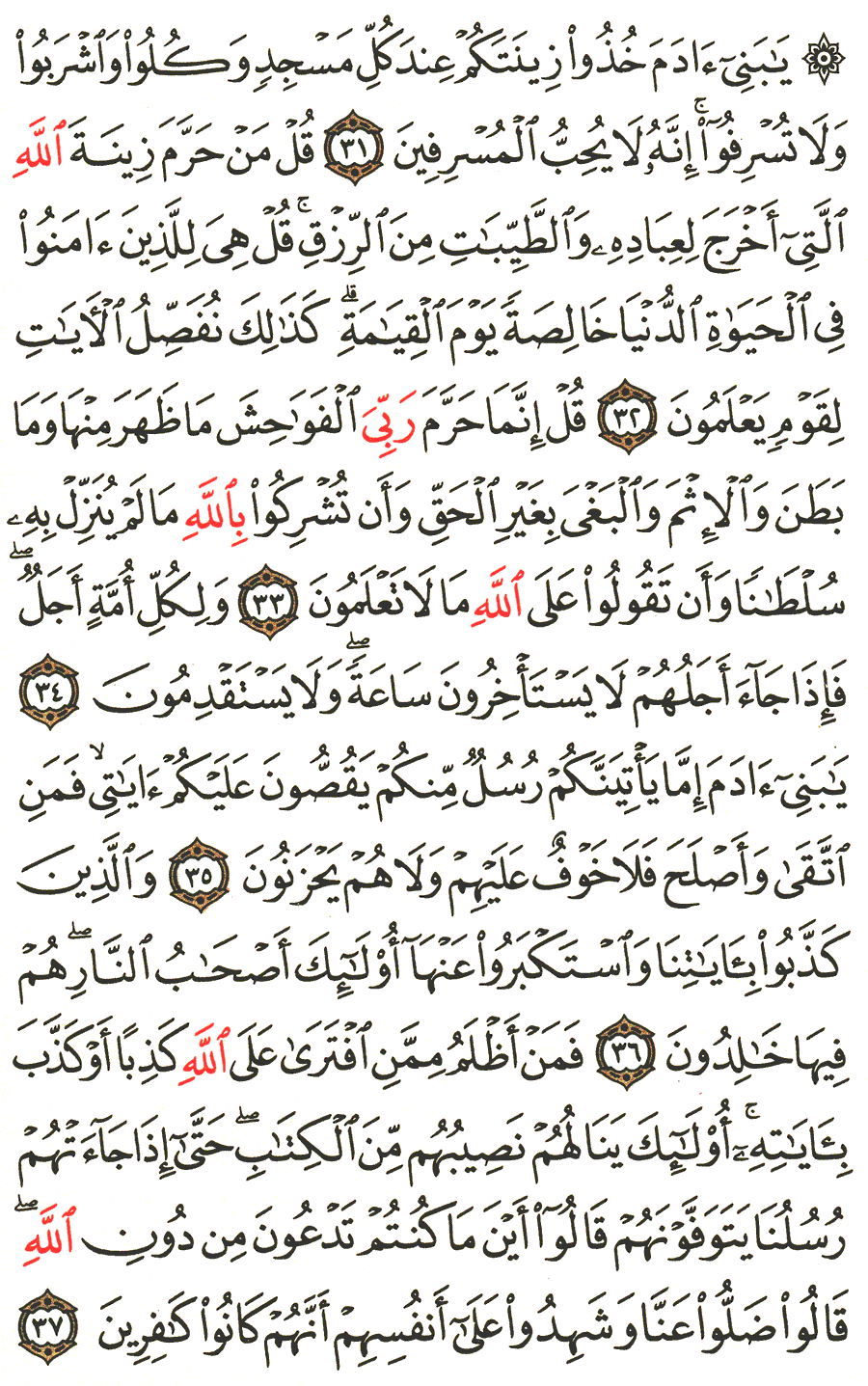Surah Al-A'raf | from the moshaf in arabic uthmani
| Listen mp3 | Tafsir Arabic | tafsir mokhtasar |
| English | Indonesian | French |
| German | Hausa | Spanish |

English translation of the meaning Page No 154
Sura Al-A'raf from 31 to 37
31. O Children of Adam! Take your adornment ( by wearing your clean clothes ) , while praying [ 1 ] and going round ( the Tawâf of ) the Ka‘bah, and eat and drink but waste not by extravagance, certainly He ( Allâh ) likes not Al- Musrifûn ( those who waste by extravagance ) .
32. Say ( O Muhammad ( saas ) ) : « Who has forbidden the adornment with clothes given by Allâh, which He has produced for His slaves, and At- Taiyyibât [ all kinds of Halâl ( lawful ) things ] of food? » Say: « They are, in the life of this world, for those who believe, ( and ) exclusively for them ( believers ) on the Day of Resurrection ( the disbelievers will not share them ) . » Thus We explain the Ayât ( Islâmic laws ) in detail for people who have knowledge.
33. Say ( O Muhammad ( saas ) ) : « ( But ) the things that my Lord has indeed forbidden are Al- Fawâhish ( great evil sins and every kind of unlawful sexual intercourse ) whether committed openly or secretly, sins ( of all kinds ) , unrighteous oppression, joining partners ( in worship ) with Allâh for which He has given no authority, and saying things about Allâh of which you have no knowledge. »
34. And every nation has its appointed term; when their term comes, neither can they delay it nor can they advance it an hour ( or a moment ) .
35. O Children of Adam! If there come to you Messengers from amongst you, reciting to you My Verses, then whosoever becomes pious and righteous, on them shall be no fear nor shall they grieve.
36. But those who reject Our Ayât ( proofs, evidence, verses, lessons, signs, revelations ) and treat them with arrogance, they are the dwellers of the ( Hell ) Fire, they will abide therein forever.
37. Who is more unjust than one who invents a lie against Allâh or rejects His Ayât ( proofs, evidence, verses, lessons, signs, revelations ) ? For such their appointed portion ( good things of this worldly life and their period of stay therein ) will reach them from the Book ( of Decrees ) until when Our Messengers ( the angel of death and his assistants ) come to them to take their souls, they ( the angels ) will say: « Where are those whom you used to invoke and worship besides Allâh, » they will reply, « They have vanished and deserted us. » And they will bear witness against themselves, that they were disbelievers.
[1] (V.7:31) It is obligatory to wear the clothes while praying. And the Statement of Allâh (Lord Almighty and Exalted): "Take your adornment [(by wearing your clean clothes) covering completely the ‘Aurah (covering of one’s ‘Aurah means: while praying, a male must cover himself with clothes from the umbilicus of his abdomen up to his knees, and it is better that both his shoulders should be covered. And a female must cover all her body and feet except face, and it is better that both her hands are also covered)], while praying and going round (the Tawâf of) the Ka‘bah.
In how many ( what sort of ) clothes a woman should pray? ‘Ikrimah said, « If she can cover all her body with one garment, it is sufficient. »
It is agreed by the majority of the religious scholars that a woman while praying should cover herself completely except her face, and it is better that she should cover her hands with gloves or cloth. but her feet must be covered either with a long dress or she must wear socks to cover her feet. This verdict is based on the Prophet’s statement ( Abu Dâwûd ) .
Narrated ‘Âishah ( raa ) : Allâh’s Messenger ( saas ) used to offer the Fajr prayer and some believing women covered with their veiling sheets used to attend the Fajr prayer with him, and then they would return to their homes unrecognized. ( Sahih Al- Bukhâri, Vol.1, hadîth No.368 ) .










Page No 154 Download and Listen mp3